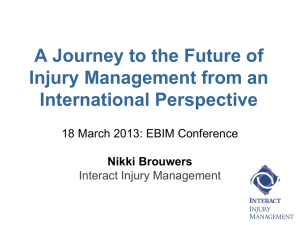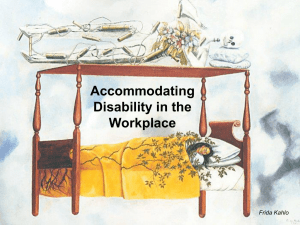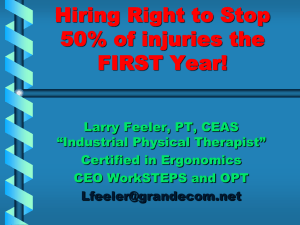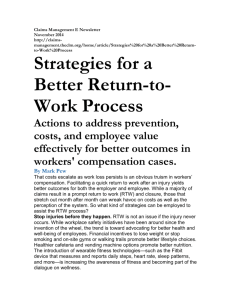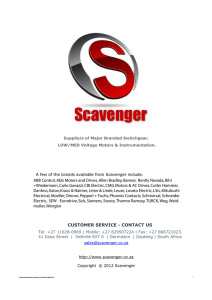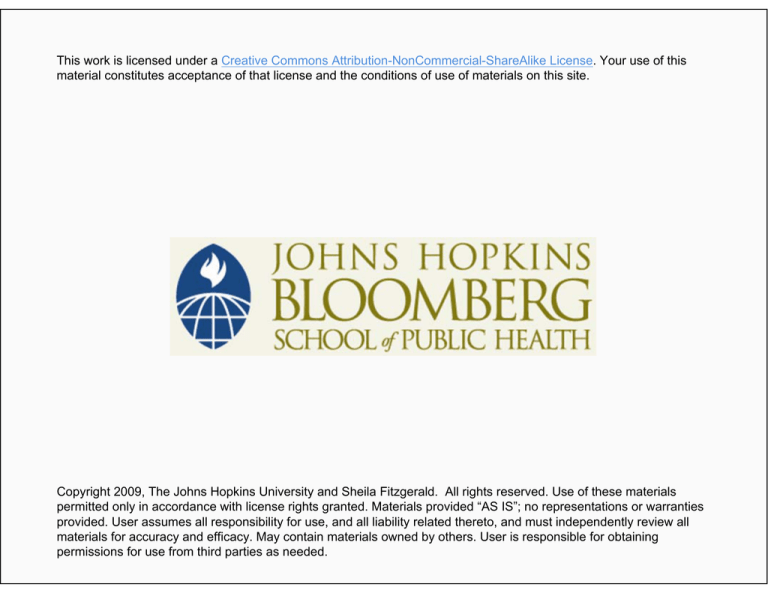
This work is licensed under a Creative Commons Attribution-NonCommercial-ShareAlike License. Your use of this
material constitutes acceptance of that license and the conditions of use of materials on this site.
Copyright 2009, The Johns Hopkins University and Sheila Fitzgerald. All rights reserved. Use of these materials
permitted only in accordance with license rights granted. Materials provided “AS IS”; no representations or warranties
provided. User assumes all responsibility for use, and all liability related thereto, and must independently review all
materials for accuracy and efficacy. May contain materials owned by others. User is responsible for obtaining
permissions for use from third parties as needed.
Return to Work (RTW) and
Maintenance of Employment
Sheila T. Fitzgerald, PhD, RN, NP
Johns Hopkins University
Section A
Disabling Conditions—Activity Limitations
The Right to Live, Work
“To every man his chance—to every man the right to live,
work, to be himself and to become whatever thing his
manhood and his vision can combine to make him.”
— Thomas Wolfe, You Can’t Go Home Again, 1940
4
Disabling Conditions—Activity Limitations
Cardiovascular disease
Back problems
Arthritis
Asthma
Diabetes
Mental disorders
Visual impairments
Learning disabilities and mental retardation
Cancer
5
Impairment
Loss and/or abnormality of mental, emotional, physiological, or
anatomical structure or function
Includes all losses or abnormalities, not just those attributable to
active pathology; also includes pain
Defined by medical diagnosis
6
Functional Limitation
Restriction or lack of ability to perform a task in the manner or
within the range considered normal, which results from impairment
E.g., inability to grasp, pull with arm
May be limited but no disability
7
Disability
Inability or limitation in performing socially defined roles or
activities expected of individuals within a social and physical
environment
E.g., maintenance of employment
8
Americans with Disabilities Act (ADA) >15 Employees
Title I: Employment
Title II: State and Local Governments
Title III: Public Accommodation and Commercial Facilities
Title IV: Telecommunications
Title V: Miscellaneous Provisions
9
Americans with Disabilities Act (ADA) >15 Employees
Title I: Employment
Title II: State and Local Governments
Title III: Public Accommodation and Commercial Facilities
Title IV: Telecommunications
Title V: Miscellaneous Provisions
10
Reasonable Accommodation
Making facilities accessible
Job restructuring, part-time or modified work schedules
Acquisition or modification of equipment or devices
Reasonableness or accommodation based on cost and impact on
business
11
Pre-placement Assessments
Must be performed after an applicant has been offered a position
Can only evaluate the applicant’s ability to perform the identified
critical functions of the job being offered
12
Family Medical Leave Act (FMLA)—1993 EEOC
Employers with more than 50 employees must provide up to 12
weeks of unpaid, job-protected leave in any 12-month period
Eligibility—12 months of employment and 1,250 hours prior to leave
State/federal employees eligible
13
FMLA (cont.)
A woman or a man with a new or newly adopted child can apply
Rights of employee—return to same or equivalent position, benefits,
compensation, and conditions of employment
Employer may require medical certification
14
Section B
Components of a Disability Management Program
Components of a Disability Management Program
Corporate philosophy that values employees
Gain senior management support
Intervene early and regularly
Develop case management capabilities
Create modified/light-duty jobs to allow early RTW
Cultivate supervisors who allow and encourage early RTW
Educate local physicians
16
Benefits
Reduce employee turnover and lost time
− Reduce hiring or training costs
−
Retain experienced employees
Reduce accident and workers’ compensation costs
Improve employee relations and morale
Boost overall productivity and company image
17
Case Management
Case management—a process of coordinating health and
rehabilitation services for an individual worker from the onset of an
injury or illness to an optimal return-to-work status or a satisfactory
alternative
− Achieve optimal, quality care
−
Deliver cost-effective care
18
Workers’ Compensation
Income replacement
Support for dependents because of occupation-related death
Hospital, medical, and funeral expenses
Incidental expenses such as travel and parking
19
Work-Related Illness
Time elapsed between exposure and onset of illness
Insidious onset of illness
Multi-factorial nature of the illness
Obscurity of exposure because of the inability to detect low levels of
toxic substances
20
Light Duty
Adaptation of an employee’s original job
Generally, "light duty" refers to temporary or permanent work that is
physically or mentally less demanding than normal job duties
Light duty is an interim step in the physical conditioning and
recovery of an injured employee with temporary restrictions with
the goal of returning to his/her original job
21
Limited Duty Work
A job that is appropriate to an injured worker’s skills and interest as
well as his capabilities
22
Work Hardening
A progressive individualized program for conditioning
23
Job Modification
Change in duties, hours, expectations of the job
24
Section C
Factors That May or May Not
Influence the Return to Work
Environmental Factors
Work demands
Work environment
Organizational/social aspects
Temporal aspects
Ergonomic aspects
Travel
26
Factors That Influence RTW
Demographic
Occupational
Psychosocial
Clinical
27
Demographic Factors
Age
Gender
28
Demographic Factors
Age
Gender
Education
29
Demographic Factors
Age
Gender
Education
Marital status
Number of dependents
SES
30
Occupational Factors
Employment status prior to illness/injury
Stability of employment
Job classification
31
Occupational Factors
Employment status prior to illness/injury
Stability of employment
Job classification
Job satisfaction
Job demands
Availability of early retirement/disability
32
Psychosocial Factors
Response to illness
− Depression
−
Anxiety
Social support
− Employer
−
−
Co-workers
Family
33
Psychosocial Factors
Response to illness
− Depression
−
Anxiety
Social support
− Employer
−
−
Co-workers
Family
Self-efficacy/motivation/intention
Functional status
34
Clinical/Physical Factors
Disease severity
Duration of disease
Presence of co-morbidity
Symptomatology
35
Predictors of Work Disability after Limb Trauma
Median RTW time: 600 days
Returned to different job (26%)
Job limitations
Non-RTW: related to injury
Greater reconstruction vs. amputation—RTW (p=0.05)
Young age, white, high school or college education, high selfefficacy—significant for RTW
Blue collar jobs with high physical demands: low RTW
Source: MacKenzie et al. (2006).
36
Environmental Barriers after Traumatic Brain Injury
CHIEF Inventory
− Addresses physical, environmental, and architectural barriers
−
Potential barriers, such as family and community attitudes,
access to technology and information, government policy, and
employment issues
Source: Whiteneck et al. (2004).
37
Environmental Barriers after Traumatic Brain Injury
CHIEF Inventory
− Addresses physical, environmental, and architectural barriers
−
Potential barriers, such as family and community attitudes,
access to technology and information, government policy, and
employment issues
Report of statistically significant barriers
− Age (older)
−
−
Marital status (married)
Premorbid employment (not employed)
Source: Whiteneck et al. (2004).
38
Web Sites
http://www.cdc.gov/nchs/data/series/sr_10/sr10_212.pdf
http://www.wbgh.com
http://www.eeoc.gov
http://www.ada.gov
http://www.social-security-disability-claims.org/
http://www.healthypeople.gov
39

